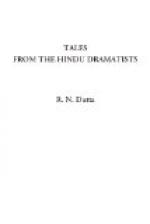Then Urvasi writes a verse on a birch-leaf, and lets it fall near the bower where her beloved reclines.
Next, her friend becomes visible, and at last, Urvasi herself is introduced to the king. After a few moments, however, both Urvasi and her friend are called back by a messenger of the gods, and the king is left alone with his jester. He looks for the leaf on which Urvasi had first disclosed her love, but it is lost, carried away by the wind. But worse than this the leaf is picked up by the queen, who comes to look for the king in the garden. The queen severely upbraids her husband, and, after a while, goes off in a hurry, like a river in the rainy season.
When Urvasi was recalled to Indra’s heaven, she had to act before Indra the part of the goddess of beauty, who selects Vishnu for her husband. One of the names of Vishnu is Purushottama.
Poor Urvasi, when called upon to confess on whom her heart was set, forgetting the part she had to act, says “I love Pururavas,” instead of “I love Purushottama.”
Her teacher Bharata, the author of the play, is so much exasperated by this mistake, that he pronounces a curse upon Urvasi. “You must lose your divine knowledge.” After the close of the performance, Indra, observing her as she stood apart, ashamed and disconsolate, calls her and says:—
“The mortal, who engrosses your thoughts, has been my friend in the days of adversity; he has helped me in the conflict with the enemies of the gods, and is entitled to my acknowledgements. You must, accordingly, repair to him and remain with him till he beholds the offspring you shall bear him.” The god thus permits her to marry the mortal hero.
After transacting public business, the king retires to the garden of the palace as the evening approaches. A messenger arrives from the queen, apprising his Majesty that she desires to see him on the terrace of the pavilion. The king obeys and ascends the crystal steps while the moon is just about to rise, and the east is tinged with red.
As he is waiting for the queen, his desire for Urvasi is awakened again. On a sudden, Urvasi enters on a heavenly car, accompanied by his friend. They are invisible to the king as on the previous occasion. The moment that Urvasi is about to withdraw her veil, the queen appears. She is dressed in white, without any ornaments, and comes to propitiate her husband, by taking a vow.
Then she, calling upon the god of the moon, performs her solemn vow and retires.
Urvasi, who is present, though in an invisible state, during this scene of matrimonial reconciliation, now advances behind the king and covers his eyes with her hands. The king says:—
“It must be Urvasi; no other hand could shed such ecstasy through my emaciated frame. The solar rays do not wake the night’s fair blossom; that alone expands when conscious of the moon’s dear presence.”
She takes the resignation of the queen in good earnest and claims the king as granted her by right. Her friend takes leave and she now remains with the king as his beloved wife in the groves of a forest.




